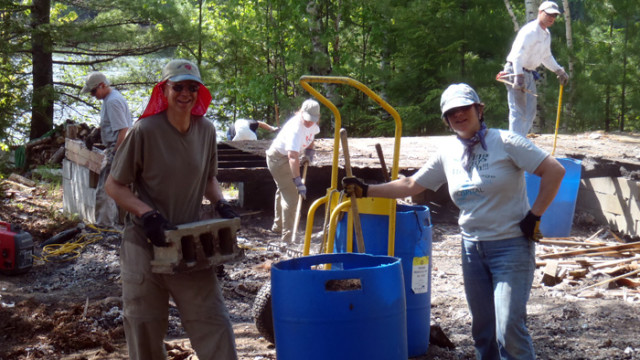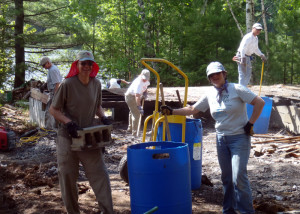
Does volunteering outdoors, getting really dirty by working really, really hard sound like a perfect active outdoors vacation to you? Well, trust us, it is. In fact, it may be the best vacation plan ever—especially if your “regular” life is filled with too much busy-ness and not enough physical activity.
Six of us from EasternSlopes.com, correspondent Deborah Lee Luskin and her husband “Timo” Shafer, publisher David Shedd and his wife, correspondent Susan Marean Shedd, and executive editor Tim Jones and his wife, correspondent Marilyn Donnelly, spent Memorial Day weekend 2012 camped at Umbagog Lake State Park in Cambridge, New Hampshire, right on the Maine border about 10 minutes southeast of Errol.
Umbagog Lake State Park was formerly a private campground. Apparently, it had gotten somewhat rundown in the past, but the state is doing a good job of spiffing it up. On the mainland, they have 3 cozy cabins which were all occupied, and 18 sites for RVs or tents, plus 4 sites for pop-ups or tents and 3 tent-only sites. Amenities include clean indoor bathrooms with hot and cold running water, hot showers, a nice beach and play area for kids, a boat launch and marina. And, best of all, there’s almost always a breeze off the lake.
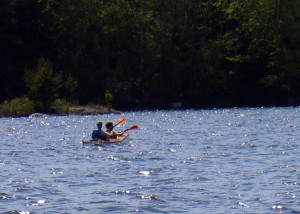
Oh, and there’s NO cell-phone service, so you have to disconnect from the “real” world. This is a great place to base an Umbagog Lake adventure, especially if you have kids. Even on a busy holiday weekend with most sites filled, it was relaxing, not too crowded or too noisy.
We all arrived at the campground on Saturday afternoon. Deb and Timo had driven up from southern Vermont, Tim and Marilyn from central New Hampshire, and David and Susan from southern Maine. It had been a typically stressful week and we were all more than willing to relax a little. We all settled seamlessly into the usual camp routine, pitched tents, set up sleeping gear, and started unwinding. A stiff northwest breeze was kicking up whitecaps on the lake. But it had the added benefit of keeping any mosquitoes and blackflies at bay— when the wind was blowing, we only saw a few insects, which is unheard of at this time of year.
Despite the wind and waves, Deb and Timo borrowed Tim and Marilyn’s 20-foot tandem sea kayak and went for a long paddle. Play was an important part of our weekend plans. But so was work . . .
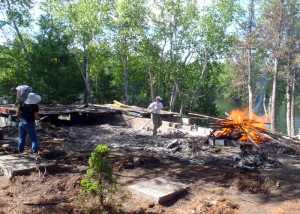
This adventure had begun back in February, when we’d talked with the folks at the Northern Forest Canoe Trail about doing a volunteer work project with a crew from EasternSlopes.com. Walter Opuszynski, the volunteer project coordinator for NFCT came up with a perfect project on the Umbagog Lake National Wildlife Refuge.
You see, the most popular campsites on Umbagog aren’t the ones at the State Park. The real draw, is the 32 remote tent campsites accessible only by boat. These are on the National Wildlife Refuge, but are administered by the State Park. Some time ago, the Refuge had purchased an island with a camp on it, with an eye toward removing the camp and creating another remote campsite to replace one that is in a loon territory and has to be closed while the loons are nesting and rearing their young. A previous volunteer crew had dismantled the cabin’s interior last fall and a crew from the Refuge had burned the shell in March when the snow was deep.
Now, they needed help cleaning up the island and turning it into a safe, clean remote campsite. We figured pitching in to help would make a perfect long-weekend getaway. A lot of the EasternSlopes.com crew had initially volunteered for the project. But then life intervened on a long holiday weekend and we ended up with just six. Six enthusiastic people was plenty! We’d spend one day working, two days playing. Turned out the play was fun, but the work was even more fun.
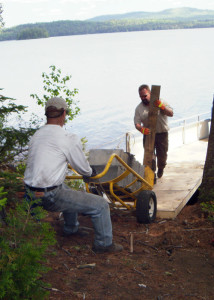
That first night, we all cooked dinner together, drank some wine, relaxed and simply enjoyed the setting. We were tucked into our tents as soon as it got dark. Up early on Sunday morning, we scrambled a huge pan of fresh eggs from Deb’s chickens and ate everything else in sight to fuel our coming workday.
Volunteering Outdoors: Pitching In and Making Progress
Promptly at 8 o’clock, as planned, we connected with Ian Drew from the Refuge, who loaded us aboard a large pontoon boat with an assortment of tools and took us out to the island. The lake was calm and the 20-minute ride out was lovely. The island, however, wasn’t. At least, not the part we’d come to work on. The former house site was a nightmare of broken glass, rusty nails, tangled wires and plumbing, ash, charred wood and cement-block foundations. Part of the floor still stood on the foundation. Yuck. We all gaped in dismay for a moment at the mess, wondering if we could accomplish anything at all.
Then, something almost magical happened. Everyone picked up a rake, shovel or crowbar and started somewhere. One of the first things we did was create a burn pit (Ian had gotten a burn permit) encircled with cement blocks and light a fire to get rid of some of the wood still piled around. We fed it continuously for the next four hours and still left a big pile of stuff for the next work crew to burn . . .
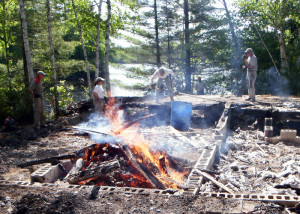
About five minutes (maybe not that long . . .) after we shook off our initial dismay and started working, the laughter started and it never stopped for the rest of the day. Sometimes we worked alone, sometimes two or three of us came together to accomplish a specific task. No one ever needed to be told what to do; we all just pitched in and did whatever needed doing. Gradually, all the electrical wires, plumbing and miscellaneous metal got sorted into a recycle pile, broken glass, old nails, and ashes got raked up and shoveled into 50-gallon barrels. The remaining floor and floor joists were dismantled and either thrown onto the fire or piled nearby for another fire later.
It’s amazing what six motivated people can accomplish together, all while laughing and having fun.
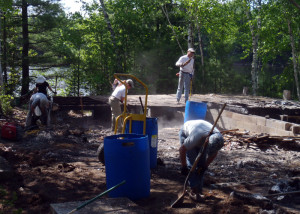
Less than an hour after we started, the progress was already visible and the first load of refuse had left the island. Four times we loaded the pontoon boat with piles of metal, 20 barrels of debris and, literally, tons of cement blocks. All that traveled to the mainland where it was piled for recycling or loaded into a dump truck for transport to the landfill.
Not counting the break we took for lunch, and the time the women spent skinny-dipping in the lake while the guys were taking a load of debris to the mainland, we worked about four solid hours. By the time Ian called a halt, all the old floor was gone—either burned or stacked in a neat pile for later burning. Most of the foundation was gone. Two old wells had been filled with rubble, much of the site was raked clean of glass, ash and debris . . .
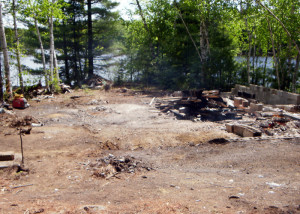
Marilyn summed up the whole experience for all of us: “Being a nutrition counselor, I can never see the results of my work in one day. I’ve done hard work in my life, but never this specific type of physical labor. Sure, I’ve participated in remodeling my homes and those of friends, but this was, in actuality, cleaning up after a house fire. But there was no sadness here, only joy in removing the old to make something new… Working together or alone, choosing for ourselves what needed to be done and what we felt like doing, each person picked a task and just dove in. We were laughing all the time, and so proud of what we were accomplishing. In just four hours the island was totally transformed and all six of us had a fabulous time. What started as a horrifying mess…glass, metal, wood, concrete blocks, bricks, ashes, insulation, defunct hoses, doorknobs, even melted spoons…turned into a (mostly) neat and tidy lot, ready after a bit more work, to become a campsite that will be enjoyed and treasured by many people for many years to come.”
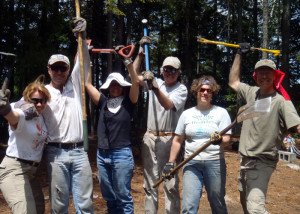
By the time we quit, we really could see the layout of what will be a stunning island campsite. Paddlers along the Northern Forest Canoe Trail will be able to use it, and so will everyone else. No, we didn’t finish the job, but what we left was a lot closer to done than what we’d found when we arrived. Talk about immediate gratification!
A few days later, we were all thinking about what hadn’t been finished yet. Ian has another volunteer work crew scheduled to go onto “our” island and get more done sometime later this summer. But just in case they don’t finish the job, we’ve all been sending emails back and forth, planning another Umbagog work weekend. We’d like to get it done so you (and we!) can enjoy the island campsite next summer.
Be sure to write to us and tell us how you liked it!
If You Go
You can see a map of the whole layout of camping possibilities on Umbagog at Reserve America, where you make reservations. Be warned, the remote campsites are very popular in summer and you have to plan ahead . . .
All of these campsite are only accessible by boat. This is the perfect spot for kayak or canoe camping—just be sure your loaded boat can safely handle the winds and waves that Umbagog is famous for. More than one overloaded canoe has had to beat a hasty retreat to shore when the wind picked up. In those instances, or for people who have more stuff than their boat can handle, the state park offers a ferry service ($32-$64 in 2012) to get you and gear to the campsites and back.
Nearby Errol, New Hampshire is a classic “gateway” town to the great outdoors. Wonderful place. Some of us have been going there for decades, and now the rest of us are eager to return. Most of the businesses in town are focused on helping people enjoy the outdoors. There are friendly, clean, welcoming places to stay in town (I like 150 Main Street On the Adroscoggin), the Northern Exposure restaurant serves good meals at great prices and L.L. Cote’s store (www.llcote.com) is a real-deal outdoor shop.
In summer, Errol is surrounded by rivers and lakes for paddling and fishing. The Magalloway River which flows into Umbagog is a fine place for flatwater paddling, and the Androscoggin, which flows out of the lake and right through Errol has whitewater stretches. Umbagog is the most pristine large lake in New Hampshire—much of the shoreline is now protected by the National Wildlife Refuge. Loons, waterfowl and moose are everywhere; at night you can hear the coyotes howl.
The hills around are laced with hiking and mountain biking opportunities, in the winter, snowmobiles and cross-country skiers and dogsledders flock here. If you like the outdoors, you’ll love it this little corner of paradise.


